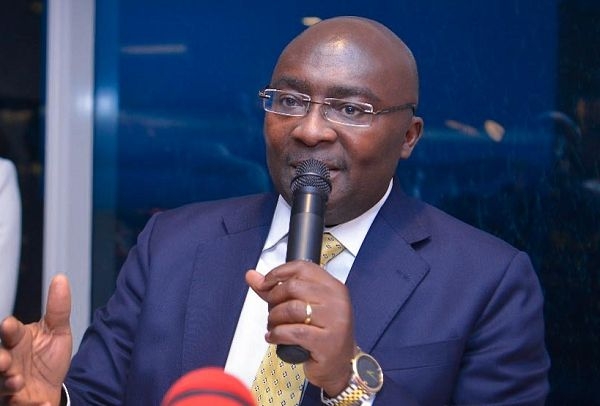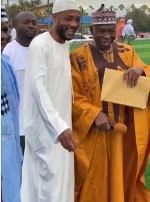Bawumia hails UG scientists for successful COVID-19 genome sequencing
 Vice President Bawumia
Vice President Bawumia
Vice-President Mahamudu Bawumia has commended scientists at the University of Ghana (UG) for a successful sequencing of the genomes of SARS-CoV-2, "to help track mutations and trace community infections” of COVID-19.
The scientists, who work at the Noguchi Memorial Institute for Medical Research (NMIMR – College of Health Sciences) and the West African Centre for Cell Biology of Infectious Pathogens (WACCBIP – College of Basic and Applied Sciences) at the University, analysed samples from selected cases to gain a comprehensive understanding of the variations of the virus that are present in the country.
Genome sequencing allows for the compilation of the most comprehensive information about an organism’s genetic makeup.
Using advanced next-generation sequencing methods, the scientists are able to track and compare viral mutations to understand the origins of imported strains and to discover if any novel strains are emerging locally.
“The successful establishment of this sequencing capability at the University of Ghana is a significant milestone in Ghana’s response to the pandemic, as it will strengthen surveillance for tracking mutations of the virus and aid in the tracing of the sources of community infections in people with no known contact with confirmed cases,” said Prof Abraham Anang, Director of NMIMR.
The samples analysed were taken from two travellers who arrived in Ghana from the UK, one from Norway, one from Hungary, one from India, and one traveller who arrived from the United States through the United Arab Emirates. Nine samples were taken from individuals who had no travel history, who are believed to have acquired the infection locally.
“The data tells us that, while there were some differences between the strains from the various countries, all the 15 genomes generally resembled (with >92% similarity) the reference strain that was isolated in the Wuhan Province of China, where the outbreak began,” said Prof. Gordon Awandare, Director of WACCBIP. “This confirms that we are dealing with the same pathogen, and that it has not yet changed its genetic make-up significantly. It is natural that pathogens will evolve as they encounter different environmental challenges, so we will need to continue monitoring to keep track with these changes and determine how they impact on the efficacy of potential drugs or vaccines that are being developed”, he added.
The information from the sequenced data has been shared with scientists around the world through an open-access platform known as the Global Initiative on Sharing All Influenza Data (GISAID) database, where other sequences from various countries are stored (https://www.gisaid.org/).
“The University of Ghana is proud to note that this feat was achieved entirely by local scientists using established local capacity including our Next Generation Sequencing Core and ‘Zuputo’, our High-Performance Computing system, which are jointly managed by NMIMR and WACCBIP, with support from the University of Ghana Computing Systems,” said Prof. Ebenezer Oduro Owusu, Vice-Chancellor of the University. “We would like to express our gratitude to the government of Ghana, and all the funding agencies that have provided grants to support the operations of our two flagship centres of excellence for biomedical research,” the Vice-Chancellor added.
Reacting to this in a Facebook post, Dr Bawumia said: “Our Ghanaian scientists at Noguchi Memorial Institute for Medical Research and the West African Centre for Cell Biology of Infectious Pathogens (WACCBIP) at the University of Ghana have successfully found the sequenced genomes of SARS-CoV-2, the virus responsible for the global COVID-19 pandemic.
“This is a major contribution to science in the fight against COVID-19 and something for which all Ghanaians should be proud of.
“We have the capability and our research institutions do make significant contributions to science. We can do it if we put our minds to it! I am proud of our scientists!
Source: ClassFMonline.com
Trending News

Volta Regional Minister commends Assembly Members for unanimous endorsement of DCE nominees
11:20
Weija-Gbawe MP urges Muslims to uphold peace for national development
09:31
Weija-Gbawe MP urges urgent action on flooding in Accra
08:22
MDF calls for urgent action after fatal mining pit collapse at Mpasatia
11:08
NPP supporters angry with Ken Agyapong over his religious and tribal remarks against Bawumia
16:35
V/R: NPA support victims of Ketu South tidal waves with relief items
08:08
E/R: Hunter shoots lover at Akyem Nyafoman
10:48
Ghanaians unhappy with Kennedy Agyepong’s religious and tribal hate speech against Bawumia
16:29
Defence Minister donates food items to Ghana Armed Forces
02:59
A/R: NDC executives in Atwima Nwabiagya South reject MCE nomination of Mr. Osei Wisdom
10:36




